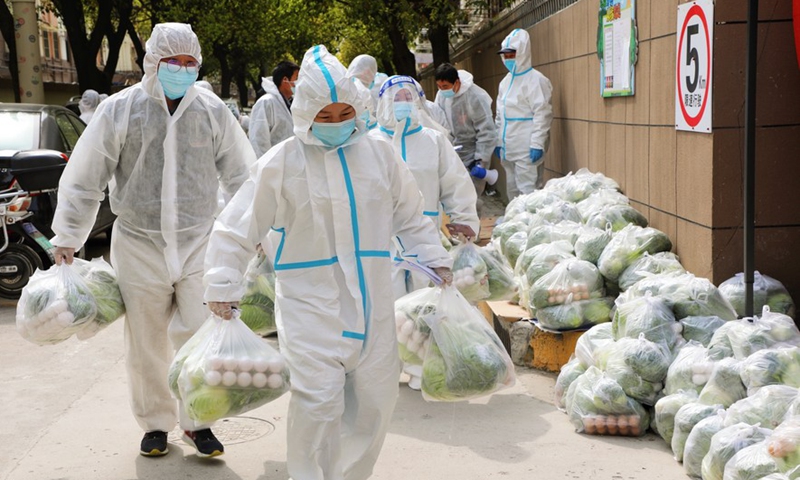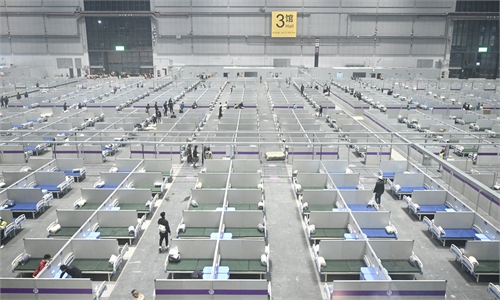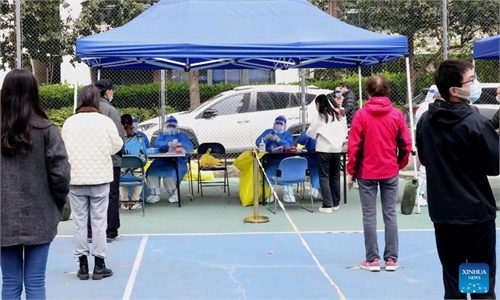E-commerce platforms, couriers in Shanghai multiply supply channels to ensure food, daily necessities

Volunteers carry daily necessities for residents in Fengxian District, east China's Shanghai, March 28, 2022.Photo:Xinhua
E-commerce platforms and couriers are multiplying supply and express channels in a bid to ensure enough food and other daily necessities to Shanghai residents during the lockdown against the Omicron outbreak.
The flare-up caused by the Omicron variant in Shanghai has not seen its inflection point, with daily new confirmed and asymptomatic infections still surging and reaching a new record of 24,943 on Saturday.
During an inspection tour in Shanghai, Chinese Vice Premier Sun Chunlan urged the city on Sunday to stick to the dynamic zero-COVID policy and spare no efforts to win the critical battle against the epidemic.
She told the city to improve efficiency and rapidly transfer personnel at risk to quarantine sites. Also, she demanded that the city consolidate the grassroots power and proactively help solve difficulties.
Shanghai authorities have vowed to ensure daily supplies for all 25 million residents and solve delivery problems. But it seems that the city will take another couple of days to effectively and comprehensively address the problems.
Gu Jun, director of the Shanghai Municipal Commission of Commerce, pointed out during a press conference on Saturday that difficulties for residents to buy food derive from distribution at the last stage, which is under pressure.
A resident surnamed Zhou told the Global Times on Sunday that her family heavily relies on group buying organized by volunteers in her compound to obtain food. Since the beginning of the citywide lockdown on April 1, her compound in Minhang district only distributed food twice and the amounts were insufficient for her family of five.
An official surnamed Ma from a compound residents' committee in Minhang district told the Global Times that the committee is exhausted with the daily operation of the compound these days as supermarkets have to provide quality certificates for their products and negative nucleic acid test results of drivers obtained within 48 hours.
On Sunday, e-commerce platforms such as JD.com and Ele.me assured the public of their capacity to supply food.
According to Wang Wenbo, a manager from JD.com, foods and daily necessities have been transported to Shanghai, including over 80,000 packs of maternity and infant products such as infant formula powders and diapers, over 100,000 items of medicines and virus prevention supplies and 10 tons of mutton.
Wang said JD.com will send milk powder to the Shanghai Children's Medical Center for the treatment and care of infants and children at the family-friendly COVID-19 wards launched at the massive makeshift hospital in the Shanghai New International Expo Center.
In terms of the storage of fresh foods, Wang said that the amount of rice, meat and seafood in stock is two or three times compared to normal times. The storage of 16 million product packs of rice, flours, edible oil can secure the daily supply to the users of JD.com for nearly one month.
Meanwhile, the company has allocated around 2,000 couriers to deliver the products. The latest model of unmanned intelligent delivery vehicles will be put into use in the seal-off areas to carry out contactless distribution.
Apart from JD.com, over 4,000 stores on the online food delivery platform Ele.me have also resumed operation over the past week.
Xiao Shuixian, senior vice president of Ele.me, said on Sunday's press conference that 2,800 riders have returned to their positions over the past week, endeavoring to address the "last 100-meter" problem, the last stage in the process of logistics to deliver the products to residents staying at home.
Besides, the e-commerce platform Hema Fresh, in cooperation with Eleme, has launched an emergency channel for residents in over 5,000 compounds and the RT-MART supermarket that Ele.me cooperates with can supply 1,000 tons of vegetables and fruits in Shanghai, according to Xiao.
Ele.me also has rolled out an emergency service to special groups including the elderly living alone, patients with chronic diseases, and infants and the under-aged. Since March 28, the platform has provided 41,230 emergency services with 95 percent of needs from the special groups in urgent needs satisfied.
However, the Global Times found on Sunday that many products available on JD.com's special site for Shanghai consumers still showed on Sunday that it will take about six days for these products to be delivered to consumers.
For a big city with a population of tens of millions, it has been a difficult problem for cities including Wuhan and Xi'an to distribute daily supplies to residents when faced with a sudden lockdown.
A community worker, who participated in the distribution of daily supplies to residents in Wuhan during the combat against COVID-19 in 2020, told the Global Times that motivating the community workers' enthusiasm and making the best of volunteers will greatly improve the efficiency of material distribution.
A community worker surnamed Pan used to be responsible for daily supplies amid the epidemic in Wuhan in 2020. According to Pan, after the city was locked down, the vegetables and meat transported to her community by logistics services were distributed by volunteers to the households. The residents could also put forward their purchasing requirements, and the community workers purchased the food at supermarkets, which were then distributed by volunteers to every household.



